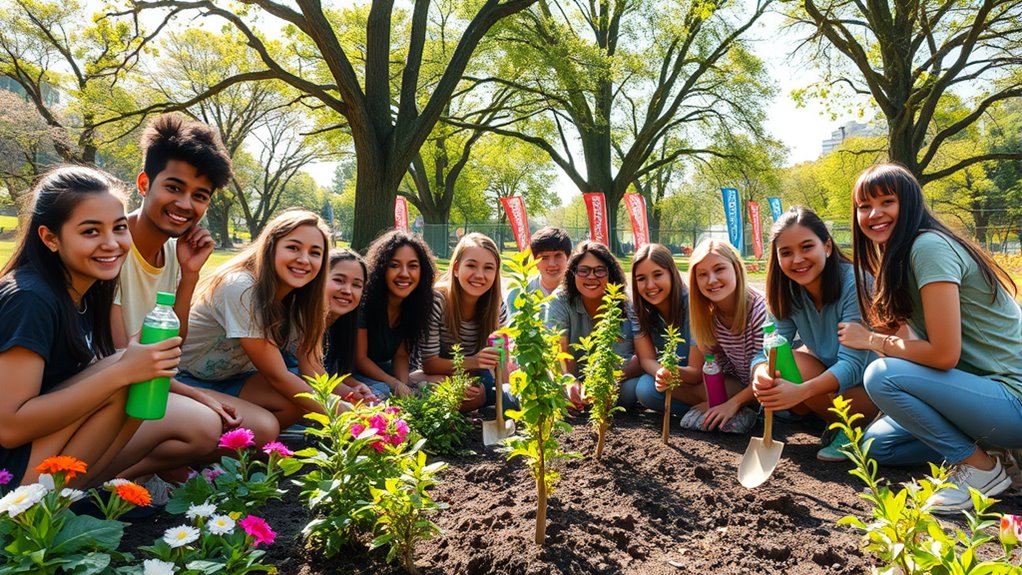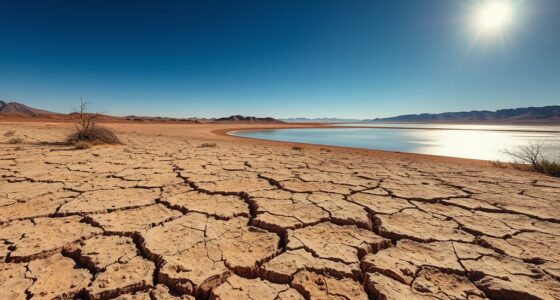Your participation in World Environment Day empowers you to lead climate action and inspire others. By raising awareness, organizing local projects, and advocating for policy change, you can make a real difference. Education plays a key role, helping you make informed decisions and promote eco-friendly habits. Connecting with fellow young activists builds leadership and community strength. Keep exploring how your efforts today can shape a more sustainable future for generations to come.
Key Takeaways
- Youth participation empowers young people to voice concerns and lead climate action initiatives during World Environment Day.
- Engaging youth through eco education and awareness campaigns builds informed, responsible environmental stewards.
- Youth-led activities like clean-ups, protests, and social media campaigns inspire peer involvement and community impact.
- Building leadership and collaboration among young activists fosters sustained commitment to sustainability efforts.
- Inspiring the next generation ensures long-term environmental stewardship and a united global response to climate change.

Every year, World Environment Day provides a powerful platform for young people to take action and make their voices heard. It’s your chance to stand up for the planet, share ideas, and push for meaningful change. As a young person, you’re at the forefront of climate activism, a movement fueled by your passion and urgency to protect our environment. The day isn’t just about raising awareness; it’s about inspiring action that lasts beyond the event. Whether you organize local clean-ups, participate in rallies, or use social media to spread your message, you’re contributing to a global effort to combat climate change. Your voice matters, and World Environment Day offers the perfect opportunity to amplify it.
Every year, World Environment Day empowers youth to voice concerns and drive global climate action.
Climate activism is evolving, and your involvement plays an essential role. You can advocate for policies that reduce emissions, support sustainable practices, or push corporations to adopt greener operations. Your actions, big or small, send a powerful message that the younger generation is committed to securing a healthier planet. Additionally, eco education is a fundamental tool that empowers you and your peers. Learning about environmental issues and solutions helps you make informed decisions and encourages others to follow suit. Schools, community groups, and online platforms host workshops, webinars, and campaigns that deepen your understanding of climate science, conservation, and sustainable living. By participating actively in eco education initiatives, you become a more effective advocate, capable of inspiring those around you to adopt eco-friendly habits. Engaging with home theatre projectors can also be a creative way to promote environmental awareness through impactful presentations and media. Moreover, understanding the importance of professional help can be crucial when facing eco-related challenges that require expert guidance or conflict resolution. Developing a spiritual connection to nature can also foster a deeper appreciation and responsibility for protecting our environment. Recognizing the significance of environmental data can further enhance your ability to support evidence-based solutions and policies. Staying informed about climate science allows you to back your activism with credible information and promotes a more compelling argument for change.
World Environment Day also fosters a sense of community among young activists. It creates a space where your ideas and efforts can connect with others who share your concern for the planet. Collaborating with peers, teachers, and environmental organizations amplifies your impact and helps you develop leadership skills. These connections can lead to ongoing projects and campaigns that extend well beyond June 5th. Furthermore, your involvement can influence your local community, encouraging more people—especially youth—to get involved in climate activism and eco education. You might organize school events, create informational campaigns, or even start youth-led initiatives that focus on environmental sustainability.
Ultimately, your participation in World Environment Day is about more than just one day of awareness; it’s about cultivating a sense of responsibility and empowerment. When you take part in climate activism and promote eco education, you become part of a larger movement working toward a sustainable future. Your actions inspire others, demonstrate your commitment, and reinforce the idea that young people are key drivers of change. As you engage with this global event, remember that your voice and your efforts are indispensable in shaping the future of our planet. Your energy, ideas, and dedication can ignite lasting change and inspire others to follow in your footsteps.
Frequently Asked Questions
How Can Youth Leaders Effectively Mobilize Peers for Environmental Action?
You can effectively mobilize your peers for environmental action by leading peer-led initiatives that inspire collective effort. Use community outreach to raise awareness and motivate participation. Share success stories, organize events, and create engaging activities that resonate with your friends. By demonstrating passion and taking active roles, you’ll encourage others to join your cause, fostering a strong, motivated youth community committed to making a tangible environmental difference.
What Are Innovative Ways to Involve Youth in Policy Discussions?
You can involve youth in policy discussions by organizing interactive workshops that encourage hands-on learning and dialogue. Incorporate art-based advocacy, such as murals or digital art projects, to creatively express their viewpoints and raise awareness. Use social media platforms to amplify their voices and create virtual forums for debate. These innovative approaches make policy engagement accessible, engaging, and empowering for youth, ensuring their perspectives shape environmental decisions.
How Can Schools Integrate Environmental Awareness Into Curricula?
You might think schools already cover environmental issues, but surprisingly, many don’t. To truly embed eco-friendly practices, integrate lessons on sustainable technology and climate impact into daily classes. Use interactive projects, like building eco-friendly models or exploring renewable energy, to make learning engaging. This way, students develop a genuine understanding of their environment, encouraging them to adopt sustainable habits and become future innovators in eco-friendly practices.
What Role Do Social Media Campaigns Play in Engaging Youth?
Social media campaigns play a crucial role in engaging youth by leveraging viral challenges and influencer collaborations. You can participate in trending challenges that spread awareness and inspire action. Influencers amplify messages, making environmental issues more relatable and accessible. By actively sharing content and encouraging peers to join, you help create a ripple effect that increases awareness and motivates young people to get involved in environmental initiatives.
How Do Cultural Differences Influence Youth Participation in Environmental Initiatives?
Did you know that cultural perceptions and traditional practices shape nearly 75% of youth participation in environmental initiatives worldwide? Your engagement varies because different cultures prioritize the environment differently, influenced by traditional practices and values. These cultural differences can either motivate or hinder youth involvement. By understanding and respecting diverse perspectives, you can foster more inclusive participation, ensuring that environmental efforts resonate across cultures and inspire the next generation globally.
Conclusion
By actively participating in World Environment Day, you empower yourself to make a difference, inspire others to act, and shape a sustainable future. Your voice matters, your actions count, and your passion fuels change. When you engage, you not only protect the planet but also uplift communities, foster awareness, and create momentum. Embrace your role, ignite your purpose, and remember: your involvement today paves the way for a healthier, greener tomorrow.









